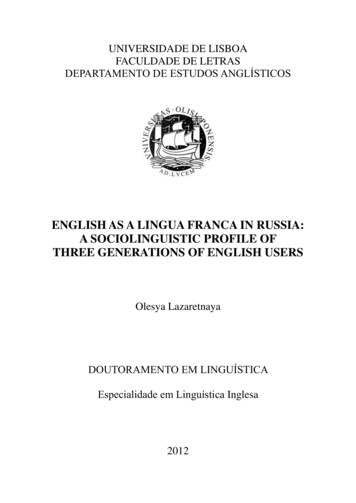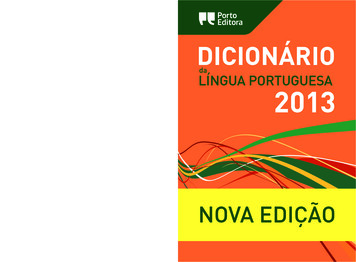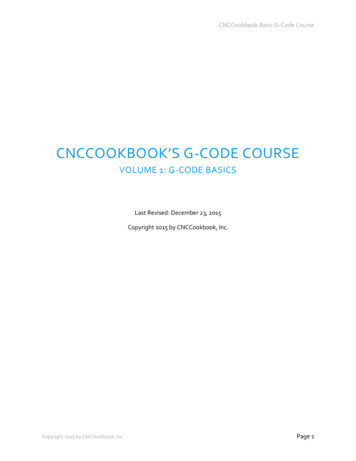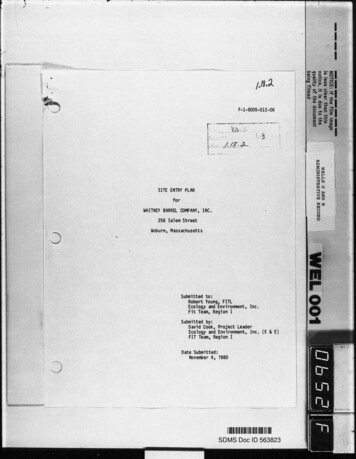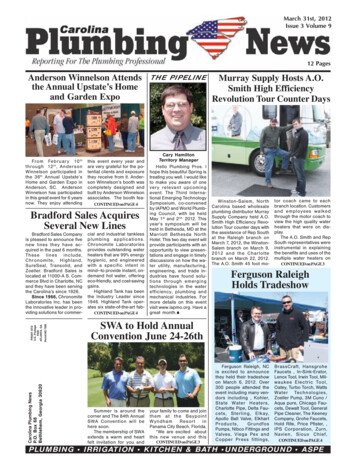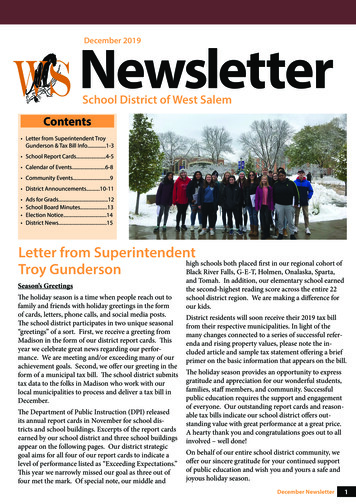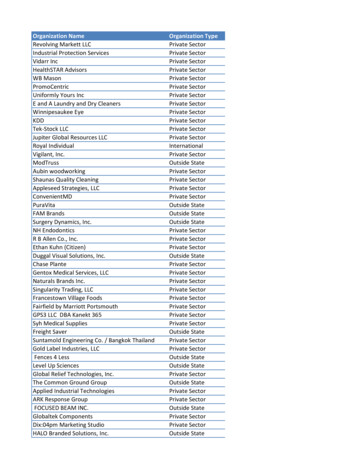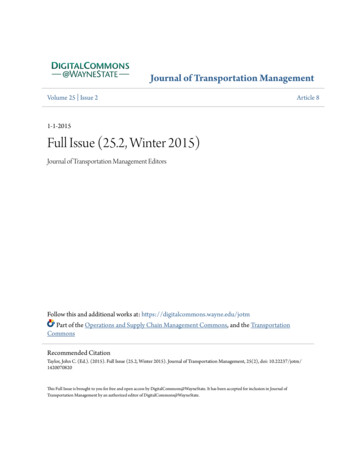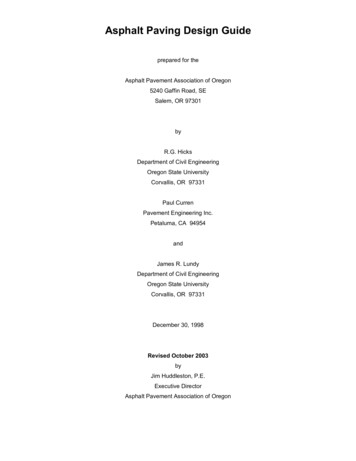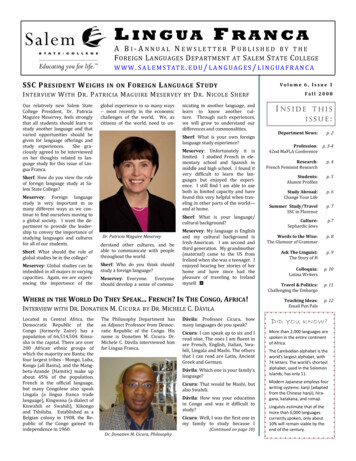
Transcription
L INGUA F RANCAA BI‐ANNUAL NEWSLETTER PUBLISHED BY THEF OREIGN L ANGUAGES D EPARTMENT AT S ALEM S TATE C OLLEGEW W W . S A L E M S TAT E . E D U / L A N G U A G E S / L I N G U A F R A N C ASSC P RESIDENT W EIGHSIN ONF OREIGN L ANGUAGE S TUDYI NTERVIEW W ITH D R . P ATRICIA M AGUIRE M ESERVEYBYOur relatively new Salem StateCollege President, Dr. PatriciaMaguire Meservey, feels stronglythat all students should learn tostudy another language and thatvaried opportunities should begiven for language offerings andstudy experiences.She gra‐ciously agreed to be interviewedon her thoughts related to lan‐guage study for this issue of Lin‐gua Franca.nicating in another language, andlearn to know another cul‐ture. Through such experiences,we will grow to understand ourdifferences and commonalities.global experience in so many ways‐‐ most recently in the economicchallenges of the world. We, ascitizens of the world, need to un‐Sherf: What is your own foreignlanguage study experience?Meservey: Unfortunately it islimited. I studied French in ele‐mentary school and Spanish inmiddle and high school. I found itvery difficult to learn the lan‐guages but enjoyed the experi‐ence. I still find I am able to useboth in limited capacity and havefound this very helpful when trav‐eling in other parts of the world—and at home.Sherf: How do you view the roleof foreign language study at Sa‐lem State College?Meservey: Foreign languagestudy is very important in somany different ways as we con‐tinue to find ourselves moving toa global society. I want the de‐partment to provide the leader‐ship to convey the importance ofstudying languages and culturesfor all of our students.Sherf: What should the role ofglobal studies be in the college?Meservey: Global studies can beimbedded in all majors in varyingcapacities. Again, we are experi‐encing the importance of theD R . N ICOLE S HERFSherf: What is your language/cultural background?Dr. Patricia Maguire Meserveyderstand other cultures, and beable to communicate with peoplethroughout the world.Sherf: Who do you think shouldstudy a foreign language?Meservey: Everyone. Everyoneshould develop a sense of commu‐Meservey: My language is Englishand my cultural background isIrish‐American. I am second andthird generation. My grandmother(maternal) came to the US fromIreland when she was a teenager. Ienjoyed hearing her stories of herhome and have since had thepleasure of traveling to Irelandmyself. WHERE IN THE WORLD DO THEY SPEAK. FRENCH? IN THE CONGO, AFRICA!INTERVIEW WITH DR. DONATIEN M. C ICURALocated in Central Africa, theDemocratic Republic of theCongo (formerly Zaire) has apopulation of 66,514,504. Kinsa‐sha is the capital. There are over200 African ethnic groups ofwhich the majority are Bantu; thefour largest tribes ‐ Mongo, Luba,Kongo (all Bantu), and the Mang‐betu‐Azande (Hamitic) make upabout 45% of the population.French is the official language,but many Congolese also speakLingala (a lingua franca tradelanguage), Kingwana (a dialect ofKiswahili or Swahili), Kikongoand Tshiluba. Established as aBelgian colony in 1908, the Re‐public of the Congo gained itsindependence in 1960.BY DR. MICHELE C. DÁVILAThe Philosophy Department hasan Adjunct Professor from Democ‐ratic Republic of the Congo. Hisname is Donatien M. Cicura. Dr.Michele C. Dávila interviewed himfor Lingua Franca.Fall 2008INSIDE THISISSUE:Department News:p. 2Profession:42nd MaFLA Conferencep. 3 4Research:French Feminist Researchp. 4Students:Alumni Profilesp. 5Study Abroad:Change Your Lifep. 6Summer Study/TravelSSC in Florencep. 7Culture:Sephardic Jewsp.7Words to the Wise:The Glamour of Grammarp. 8Ask The Linguist:The Story of Hp. 9Colloquia:Latina Writersp. 10Travel & Politics:Challenging the Embargop. 11Teaching Ideas:Email Pen Palsp. 12Dávila: Professor Cicura, howmany languages do you speak?D ID YOU KNOW ?Cicura: I can speak up to six and Iread nine. The ones I am fluent inare French, English, Italian, Swa‐hili, Lingala and Mashi. The othersthat I can read are Latin, AncientGreek and German.More than 2,000 languages arespoken in the entire continentof Africa.Dávila: Which one is your family’slanguage?Cicura: That would be Mashi, butalso Swahili.Dávila: How was your educationin Congo and was it difficult tostudy?Cicura: Well, I was the first one inmy family to study because IDr. Donatien M. Cicura, PhilosophyVolume 6, Issue 1(Continued on page 10)The Cambodian alphabet is theworld's largest alphabet, with74 letters. The world's shortestalphabet, used in the SolomonIslands, has only 11.Modern Japanese employs fourwriting systems: kanji (adaptedfrom the Chinese hanji), hira‐gana, katakana, and romaji.Linguists estimate that of themore than 6,000 languagescurrently spoken, only about10% will remain viable by theend of the century.
PAGE 2F ALL H ONORS P ROGRAMThe following MAT in Spanishstudents are honorees of the FallGraduate Honors Program. They havea GPA of at least 3.85 and are at least18 credits into the program: Lilliam Duffy Scott Estes Mary Giordano Jennifer Gray Carolynne McCormick Gerda Pasquarello Karine Poulin Jessica Stryhalaleck Julie Wall Rebecca WolfPoetry CornerUn poema de amorque es canción desesperadaPuedo escribir los versos mástristes este día.Escribir por ejemplo:Él no me llamay tiritan de rabiamis labios a lo lejos. Acabada de palabrasme niegoa declararme extintade presentimientos de palmascocoteras de mi infanciaque pueblan los auguriosmás lejanos de muertessolitarias en un llanode azucenas pálidascomo aquella muerte saboreadaen lo infinito de un duelosiamés olvidando los frutosdel vedado arrebol que dejómis mejillas mucho antesde que me quedara sin palabrasde mover montañas a tu huertoaprisionado de recuerdosinútiles que te engañan porno ver como yo no te quieroy me voyantes de ti en tu víspera demuerte volátil de universosvacíos para poblarme de palabrascuando ahora encuentro miextinción presunta de vanidadescaldeadas sin esperanza devolver como un cometaderribado al silencio.—By Michele C. Dávila GonçalvesLINGUA FRANCA¿Q UÉ PASA ? Q UOI DE NEUF ? D E PA RT M E N T N E W S A B O U N D SNew Faces in the DepartmentAs we announced in the previ‐ous issue of LF, Dr. MicheleDávila Gonçalves has joined thefull time, tenure‐track facultyand our second Hispano‐Americanist. Dr. Dávila can alsoteach Portuguese.Dr. Kenneth Reeds joined thefull‐time faculty for the year,replacing Dr. Ana Echevarría‐Morales, who is on her secondyear of leave.Prof. Abdelwahab Ab‐delfattah is teaching ourArabic courses this year.He is from Egypt and heis also a composer ofcontemporary classicalmusic (a member of thatnation's third genera‐tion of classical compos‐ers).Spanish Club presenting VocesInocentes. Thanks to all whoattended. We hope to continuethis tradition in the future!Dr. Dávila, one of the SpanishClub advisors, started “La Ter‐tulia”, a Spanish table on Thurs‐day afternoons in the lobby ofMeier Hall. This is an opportu‐nity for students to converse inSpanish in an informal setting.The Spanish Club is looking fornew leadership andincreased member‐ship. Please contactDr. Dávila or Dr. Aske.The French Club willbe fundraising withthe Foreign Lan‐guages DepartmentProf. Abdelfattahthis winter for theHeifer Project, a non‐profit inter‐national organization aimed atThere were two new part‐timebuilding sustainable communi‐faculty in the fall, Prof. Joelties in the developing world. WeSimilien in French and Prof.will be raising money to pur‐Terri Gallo and Italian. Natechase goats for families in need.Gravel will be a new SpanishGoats can produce up to fourinstructor in the Spring (forquarts of milk per day. Look forSPN204).our fundraisers in early spring!For more information about ourfaculty, go to ourfaculty web page.Curriculum changesThere has been a lot of develop‐ment of the curriculum in theForeign Languages Departmentthis year. In Spring 2009, Dr.Rocca will offer a new diversitycourse in French called"Readings from FrancophoneAfrica and the Caribbean" (FRE354). Drs. Rocca and Blood arealso developing new upper‐level courses in French andItalian culture and literature fornext year. In addition, the De‐partment is preparing propos‐als for "Travel‐Study" seminarsin Spanish, French, and Italian,that will allow us to conductcourses in foreign countrieswhere students will be able tostudy and practice speaking thelanguage. In Spanish, newcourse proposals have beencreated by Dr. Dávila and Dr.Serra. Dr. Dávila's new course isa survey of US Latino/a Litera‐ture in Spanish and Dr. Serra’sis an upper‐level course on filmfrom the Spanish‐speakingworld. Dr. Sherf and Dr. Dávilaalso proposed a new course forthe graduate school, SPN 700,which is an intensive advancedgrammar review.Fieldtrip to QuébecIn November 2008,Dr. Blood and Dr.Rocca accompanieda group of 11 stu‐dents from the FRE362 Quebec Cultureand Literaturecourse that Dr. Bloodoffered this semesterfor the first time, ona fieldtrip to QuébecCity. The studentsexplored the city'scultural and histori‐cal sites and tastedmany Québécoisdelicacies.Honor SocietyThe Department recentlyvoted to join the Phi SigmaIota international honorsociety. More informationabout participation in thehonor society will be avail‐able soon!Coming in Spring 2009Language ClubsThe Foreign Lan‐guages clubs organ‐ized their annual fallfilm series, with theFrench Club showingLe dîner de cons, theItalian Club offeringLa vita è bella and theAlso, this year, the Depart‐ment is conducting anevaluation of its programsand many students will beinvolved in taking onlineproficiency testing in or‐der to gage the outcomesof the various levels offoreign language instruc‐tion at Salem State.Students from Dr. Blood’s new course FRE362 QuébecCulture and Literature visited Québec this fallLook for our annual Inter‐national Photo Contestannouncement to comeout in early spring! Also,look for the HOPE awardessay contest, whichawards a cash prize to astudent undertaking ahumanitarian project.
VOLUME 6, ISSUE 1PAGE 3SSC E DUCATORS L EARN I MPORTANCE OF “C REATING L IFE L ONG L EARNERS ”AT 42 ND A NNUAL M A FLA C ONFERENCEB Y S COTT E STESANDD R . N ICOLE S HERFSturbridge—This past Hallow‐een weekend, approximately800 educators traveled fromaround the state to attend thethree‐day Massachusetts For‐eignLanguageAssociation(MaFLA) Conference.Thisyear’s theme was titled “TheForeign Language Standards:Creating Life‐Long Learners.”According to Dr. Nicole Sherf,language teaching materials andinformation on global education.Of this year’s many participants,there was a strong contingentfrom Salem State College. Withover 20 attendees and a total of 16faculty and graduate student pre‐senters, the high value placed onthis conference at the college isclear. Dr. Sherf commented that“the MaFLA Conference is the onlyof a MaFLA Advocacy Action cal‐endar and lovely note cards bothdisplaying MaFLA poster contestwinners.Leading off Friday’s morning ses‐sions was Dr. Michele Dávila whopresented with colleagues fromBrookline High School and Fram‐ingham State College. Attendeeswere treated to a 75 minute pres‐entation on the use of film in thestudy than the MAFLA gathering.”Friday afternoon’s sessions in‐cluded a session directed by Dr.Kristine Doll. Presenters includedCatherine Frost, Natalie DeLaria,Julie Wall, Carolynne McCormickand Margret Sears who sharedtheir findings on research dealingwith enrollment issues, challengesto foreign language methodologyand strategies for creating life‐long learners in foreign languages.Saturday morning’s sessions in‐cluded one given by MAT in Span‐ish student James Donahue. Thetitle of his presentation was“Creation and Innovation in theForeign Language Classroom withTechnology.” Donahue demon‐strated how to engage and moti‐vate students in the target lan‐guage by the use of online tools,PowerPoint and the language lab.Among the final sessions on Sat‐urday was one given by Chairper‐son of the Foreign LanguagesDept., Dr. Elizabeth Blood andItalian Professor Dr. Anna Roccawho presented with a colleaguefrom Simmons College. The talkfocused on how to access the vastamount of online news resourcesand their incorporation in theclassroom, aiding in the teachingof language and culture.Standing in front of the 2008 Student Foreign Language Poster Contest winning entries from left to right are SalemState College faculty and students Scott Estes, Christina Berry, Natalie Delaria, Dr. Nicole Sherf, Carolynne McCormick,Dr. Kristine Doll, Julie Wall, Dr. Michele Dávila and Nancy Mirra. Faculty presenters not pictured: Dr. Elizabeth Blood(Chairperson), Dr. Fátima Serra and Dr. Anna Rocca.Conference Chair, this numberof attendees represents over50% of MaFLA member‐ship. Given the current eco‐nomic climate, this numberdemonstrates the importance ofForeign Languages in the class‐room.Attendees were given a uniqueopportunity to choose from overtwenty‐two featured, six‐hourand three‐hour workshops, andover eighty concurrent ses‐sions. Topics ranged from inno‐vative technology use in theclassroom to creating engagingcultural activities. Between ses‐sions, the exhibit hall was open,offering a wide array of foreignopportunity in the state for For‐eign Language educators to gatherin such large numbers for profes‐sional development purposes. Itwas wonderful to see Salem StateCollege participating so actively.”MAT in Spanish student, ScottEstes, served as the AdvocacyIntern of the conference, writingthe lead article for the MaFLANewsletter about the conferenceand advertising conference atten‐dee participation in their localnewspapers. The Advocacy Boothdisplayed this year’s photo andessay contest winners from stu‐dents across the state. Estes alsocoordinated the sale at the boothclassroom. Several Latin‐ Ameri‐can coming‐of‐age films and theirpotential impact in the classroomwere discussed.Under the guidance of Dr. FátimaSerra, MAT in Spanish studentsChristina Berry, Gerda Pasqua‐rello and Annmarie Quezada fo‐cused on the incorporation of theculture strand from the state stan‐dards into the classroom. Topicsincluded Immigration, Galicia, andthe Spanish Renaissance.Dr.Serra was pleased at the supportshe found at her first MaFLA ex‐perience: “I cannot think of abetter way to promote, increaseand improve foreign languageSaturday’s events were concludedby a Business and Awards Lunch‐eon in which Carolynne McCor‐mick was presented with theHelen G. Agbay Scholarship andLauren Izzicupo the ISE LanguageMatters Award. Dr. Nicole Sherf,Coordinator of the MAT Spanishprogram and 2008 MaFLA Confer‐ence Chair gave a warm welcomeand introduction to those in atten‐dance. The overall success of theconference is due, in large meas‐ure, to the effort of Dr. Sherf whospent countless hours organizingand gathering the many finespeakers from across the country.Dr. Sherf has now been elected tothe role of MaFLA President.
PAGE 4FACULTY PRESENTATIONS AT MaFLADr. Fátima Serra with her studentsChristina Berry, Annmarie Quezada andGerda Pasquarello presented “La en señanza de la cultura en la clase de len gua.”Dr. Kristine Doll with her students Jes‐sica Celano, Catherine Frost, Julie Wall,Carolynne McCormick, Margaret Searsand Natalie Dellaria presented“Investigación activa/aplicación prácticaen el salón de clase.”Dr. Elizabeth Blood and Dr. Anna Roccapresented “Using Online News Re‐sources to Teach Language and Culture.”Dr. Michele C. Dávila participated in thepanel “Crecer de golpe: el cine de forma ción en Latinoamérica” and presented“El Bildungfilme de Brasil.”OTHER FACULTY PRESENTATIONSDr. Nicole Sherf, MAT in Spanish Pro‐gram Coordinator, was the FacultySpeaker for the Graduate Honors Pro‐gram this year. She also coordinated asthe Conference Chair the 42nd Fall An‐nual Conference of MaFLA at Sturbridge,MA, titled “The Foreign Language Stan‐dards: Creating Life‐Long Learners.”Dr. Anna Rocca participated in the FifthFrancophone Conference of FeministResearch at the University MohammedV Agdal Rabat, Morocco on October 21‐25 with the presentation: “Solidarité:Créativité et Stratégies Plurielles d’É coute” in the panel: “Le féminisme auservice de quell développement?” Shealso published: “Assia Djebar’s Lafemme sans sépulture: Anxiety and Testi‐monial Writing,” in Women in FrenchStudies, Volume 16, 2008.Dr. Kristine Doll was keynote speaker at“Les complexitats de la traducció,” at theSetmana Cultural Illes Balears, Mallorca,Spain. Via video conference, June 19,2008. Conference sponsored by ObraCultural Balear, L'Institut d'EstudisBaleàrics and C'an Alcover.Dr. Fátima Serra presented “Historiasentimental de la Guerra Civil: ElCorazón Helado de AlmudenaGrandes” at the 10th InterdisciplinaryCongress on Women, Mundo de Mu‐jeres/ Women’s World atthe Universidad Complutense in Madrid(Spain) on July, 2008.Dr. Elizabeth Blood presented a pa‐per on Franco‐Americans in early20th‐century Salem at the 2008 meet‐ing of the American Society for Que‐bec Studies in Quebec City. The paperwas entitled "'La ville que nous avonsadoptée': Franco‐American Identityand the Courrier de Salem newspaperin Salem, Massachusetts.”LINGUA FRANCAF IRST M A FLA E XPERIENCEB Y D R . F ÁTIMA S ERRABeing a Spanish professor, I of the public: seasoned high connection between what hap‐have attended mostly confer‐ school teachers, new teachers, pens in the high school andences on literatures and lan‐ graduate students, college pro‐ what happens in college, per‐guages and the occasional gath‐ fessors.haps more so in the foreignering on language teaching and Our panelists, all graduate stu‐ languages classes. Of course, wepedagogical issues. Although Iall analyze the trends in lan‐was very familiar withguage study, we trackthe MaFLA Conferencethe budget cuts andtaking place every yearstandardized tests at theat Sturbridge, I hadK‐12 level and we ad‐never attended it. Iminister placement testsalways associated itto our incoming studentswith an emphasis on K‐to see the new level they12 foreign languageare at. But the dialogue,education. Due to theinformal discussions andenthusiasm and profes‐human interaction at asionalism of some ofconference are as valu‐my students and theable as the studies andimpetusfromourdata gathering.TheGraduate Program Co‐MaFLA Conference was aordinator and 2008great experience person‐Christina Berry, Fátima Serra, Gerda PasquarelloMaFLA Conference Di‐ally for me, to see first‐and Ann Marie Quezadarector, Nicole Sherf, Ihand what other K‐16dents, presented very profes‐decided to participate at the sionally and the public wel‐ professionals were doing andMaFLA Conference. Together comed them warmly, adding was great for the graduate stu‐with Christina Berry, Gerda some tips to their suggestions dents to feel included in thePasquarello and Ann Marie and raising good informative professional circle. I cannotQuezada, Spanish teachers in questions. Young teachers were think of a better way to pro‐Massachusetts and participants eager to collect their activity mote, increase and improveof the MAT program, we organ‐ package and some had inquiries foreign language study than theized a Panel on the Teaching of about SSC Graduate Program.MaFLA gathering. After all, weCulture in the Language Class.are the ones who will design aThe MAT students presented an What a wonderful experience! cohesive K‐16 study plan andexpansion on their final pro‐ The MaFLA conference provided the ones who will infuse thejects of their Seminar on the a space for educators at all lev‐ enthusiasm in our students. InCultures of Spain. Most of all, els to really communicate and sum, we need each other’s sup‐what I loved was the diversity interact. We often complain in port. all disciplines that there is not aT HE 5 TH C ONGRESS OF F RANCOPHONE F EMINIST R ESEARCH :"F EMINISM M EETS THE C HALLENGES OF M ULTICULTURALISM "B Y D R . A NNA R OCCAIn October 21‐25, 136 panelistsfrom all over the world gath‐ered in Rabat for the 5th Con‐gress of Francophone FeministResearch. Forty‐five womencame from Europe, forty‐twofrom North & Sub‐SaharianAfrica, forty‐two also from Can‐ada, four from Brazil, two fromMexico, and one ‐ myself ‐ fromthe United States.Feminism and multiculturalism:two concepts that have fueledintense debate between sup‐porters of the universality ofthe principles of equality andthose sustaining the priority ofcultural specificities. Critiquesof multiculturalism are based onthe reality that certain culturalvalues do notimprovewomen's condi‐tions in patriar‐chal societies;these last areoften based ongender discrimi‐nation in pri‐vate space andthe exclusion ofwomen frompublic space.Issues comingfrom the rela‐tionship be‐tween secular and religiousfeminisms, as well as betweenNorth and Southfeminisms differ‐ently exposed tothe distortions ofglobalization, addto the controversy.At the Congress,the following top‐ics were explored:1. Feminism inEvolution: a His‐torical Approach;2. Feminism be‐tween Universal‐ism and Claims ofIdentity; 3. What(Continued on page 8)
VOLUME 6, ISSUE 1S TUDENT AND A LUMNI P ROFILES : F RENCH , I TALIANF OREIGN L ANGUAGES M INORSANDB Y D R . E LIZABETH B LOODMany students ask us "Whatcan I do with a degree in For‐eign Languages?" The answer isthat foreign language skills canbe used in a wide variety offields from education to tour‐ism to art to business and com‐munications. Employers oftenseek job candidates with for‐eign language skills and theability to relate to people froma wide variety of cultural back‐grounds. A major or a minor inForeign Languages providesstudents with these valuableskills. Here are a few examplesof how students have usedtheir languages in the "realworld".Carlos Camelo graduated fromSalem State in 2005 with amajor in Political Science andminors in both Foreign Lan‐guages(French/Italian/Spanish) and Latin AmericanStudies. He participated in thesummer study abroad pro‐lead negotiations and contractswith all the vendors and servicesour company requires to oper‐ate. For example, I deal withadvertising agencies preparingour creative content and mediaplacement and the rate cards. Ihave to work with the specialand entertainment departmentssupporting their world‐widespecials like Miss Universe inVietnam or the Olympics inChina. Or just simply operationsin Latin America. So that is why Ihave to travel so much!" Carlosloves this new job, and its travelperks. He also says, "I also loveto meet with the celebrities andgo to PR events. So next timeyou watch Telemundo think ofme. I have actually been on cam‐era a couple of times already!"Stephanie Izzicupo graduatedfrom Salem State with a Bache‐lor's degree in Psychology and aMinor in French in 2007. Shewas awarded a fellowship fromthe French government to spendthe year after graduation as an"Assistante d'anglais" in France,teaching English conversationclasses to French high schoolstudents in Nancy, France. ThisCarlos Camelo, ‘05grams in both Spain and Qué‐bec. Upon graduating, Carloswas offered a job immediatelyand worked for several years asan international sales represen‐tative for Johnson & Johnson.Last year, Carlos decided tomake a change and took a jobwith NBC Universal as a Sourc‐ing Manager for World‐WideTelemundo,theSpanish‐language television station. Inthis position, Carlos is able touse his language skills as wellas the cross‐cultural peopleskills he acquired in his Foreignlanguages classes as he travelsaround the world. When askedabout the job, Carlos says, "IStephanie Izzicupoyear abroad, fully funded by theFrenchgovernment,gaveStephanie the chance to expandon the French skills she learnedat Salem State and in Québec onthe summer study abroad pro‐gram. She says of the yearabroad, "It was incredible! I metso many people and traveled allover Europe. I'm so glad I ap‐plied!" Upon return to the USthis past summer, Stephanielanded a job as a bilingual sec‐retary at the InternationalSchool of Boston, a private K‐12 school offering instructionin English and French. Stepha‐nie is enjoying the job and says"I get the chance to use myFrench on a daily basis!" She iscurrently applying to graduateschools.Antanas Meilus is a currentundergraduate student study‐ing Music and Italian. This pastPAGE 5INTERNATIONALPHOTOCONTEST2009The Foreign LanguagesDepartment announces thethird edition of its successfulinternational photo contest.The Department will select thetop 12 photos to be publishedin a calendar for 2009‐2010.The best 24 will be made into afree screensaver.We still have a few copies leftof the 2008‐2009 calendar.Call x6258. Only 8.Proceeds will supportstudent scholarships.For information onsending your pictures,go to this as Meilussummer, he had the opportu‐nity to tour Italy with the Inter‐national Lyric Academy basedin Rome and Viterbo, Italy. Thisopera company selects operasingers to travel around Italyand perform for Italian audi‐ences, allowing Antanas to usehis language skills to seize agreat professional opportunityin his field. Antanas was se‐lected to perform on openingnight of the tour in Viterbo. Hewrites in his blog "It was agreat show and very well re‐ceived by press and the 'fullpiazza' we had. It was a greatexperience for me as an artistto sing a full role with a fullyprofessionalorchestra.Thecraziest part of the entire showthat night was that it wasbroadcast on TV. I'm not surewhere, when, or anything likethat. I just know it happenedapparently!" You can readmore about the ups and downsof Antanas's summer in Italy onhis blog at antanasmeilus.com. There you can also viewthe previous years’ entriesand download the freescreensavers.Deadline: March 1, 2009Only high-quality digitalphotos will be acceptedBE A WORLD CITIZENTRAVEL THE WORLDSTUDY ABROAD
LINGUA FRANCAPAGE 6“S TUDYABROAD WON ’ T CHANGE YOUR LIFE ”B Y D R . K ENNETH R EEDSChargedwithmotivation‐razing discour‐agement,thisopinionwasarticulatedbymy college advi‐sor the summerbefore my senioryear. The ears it fell upon werereceptive, searching for any pretextto avoid spending the next threemonths in the northern Spanishcity of Oviedo. Life was good: lawschool around the corner, steadygirlfriend, and the feeling that life’snext steps appeared obvious.Study abroad was an unnecessarydeviation. I had never left thecountry and could not fathom areason to do so. Money was tightand, most importantly, foreignlanguage acquisition had long feltimpossible; so why waste time andeffort on the futile?The answer to this question wasthat I had no choice. My degreestipulated a certain number ofcredits in a foreign language. Forthree years I had pretended thisrequirement had not existed and asa result of this protracted delu‐sion, I sat before my advisor lis‐tening to him explain that the onlyway to graduate without an extrasemester was to spend threemonths abroad. Worse still, onlyone program met the needs of mycalendar and permitted a studentwith next‐to‐no language training:Oviedo. If I had to visit Spain, Iwanted a city I had heard of. Whynot Madrid, Seville, or Barcelona?“No,” my advisor affirmed, “it hasto be Oviedo. Don’t worry though;study abroad won’t change yourlife. Just get it over with and you’llcome home ready to graduate andcontinue where you left off”.In almost every sense, Oviedoproved to be the opposite of whatI had expected. This was first feltas the plane descended to revealgreen valleys and snow‐coveredpeaks – far from the arid plainsstereotyping their way throughmy mind alongside bullfighters,sangria, and flamenco dancers.My misconceptions were moreapparent as, right from the begin‐ning, the apathetic attitude withwhich I had greeted the trip wasquickly melted by an open cityand the generous people whoinhabited it. This was aug‐mented by the most surprisingreality of the experience: Span‐ish came easily. Now, do notmisunderstand what I am say‐ing: learning the language re‐quired a lot of hard work,nightly headaches, and occa‐sional frustration‐born tears.However, that effort felt natural.I wanted to be part of the city;to participate in a world so dif‐ferent from my own; to compre‐hend as much as I could. All ofthis required motivation which,back in the US, had beensquashed by what felt like insur‐mountable challenges.InOviedo the challenges of learn‐ing Spanish paled in comparisonto my enthusiasm. I wanted tolearn Spanish and there was nobetter place to do so.My college advisor was wrong.Not just because the experiencebrought a new language into mylife and altered career plans, butthanks to Oviedo I have gottento know the person who is mostimportant in my life: me. TodayI realize that the base emotionresting behind my resistance tostudy abroad was fear. I wasafraid of facing a foreign land,leaving the comfortable exis‐tence I had set out, and beingchallenged in unimaginableways. Unsurprisingly fear isalso a big obstacle to learning alanguage. Being abroad forcedme to confront and overcomethese fears and the languagefollowed naturally. Challengesare often like mirrors in thatthey force us to see ourselves,including the parts we do notlike. I did not like how much Ihad let fear inhibit me andthanks to study abroad I notonly learned how to admit thisto myself, but I was also able toovercome those fears.Whatever fears you may befacing, my advice is to not per‐mit them to stop you from ta‐king advantage of the opportu‐nity: study abroad can indeedchange your life. S TUDY A BROAD —O PPORTUNITIES A BOUND FOR S ALEM S TATE C OLLEGE S TUDENTSSummer Study Abroad programs will be of‐fered again next year in Oviedo, Spain, inFlorence, Italy and in Quebec City, Canada.There is also the option for advanced Frenchstudents to study in Avignon, France.Each program gives students the chance toearn 6 credits in foreign language at any level(beginner through advanced), plus the ex‐perience of a lifetime! Deadline for the Que‐bec, Avignon, and Florence programs is April1, 2009.For applications or more information, see Dr.Blood for French summer study programs orDr. Rocca for Italian summer study programs.For inform
The Glamour of Grammar p. 8 Ask The Linguist: The Story of H p. 9 Colloquia: Latina Writers p. 10 Travel & Politics: Challenging the Embargo p. 11 Teaching Ideas: Email Pen Pals p. 12 Fall 2008 Volume 6, Issue 1 D
